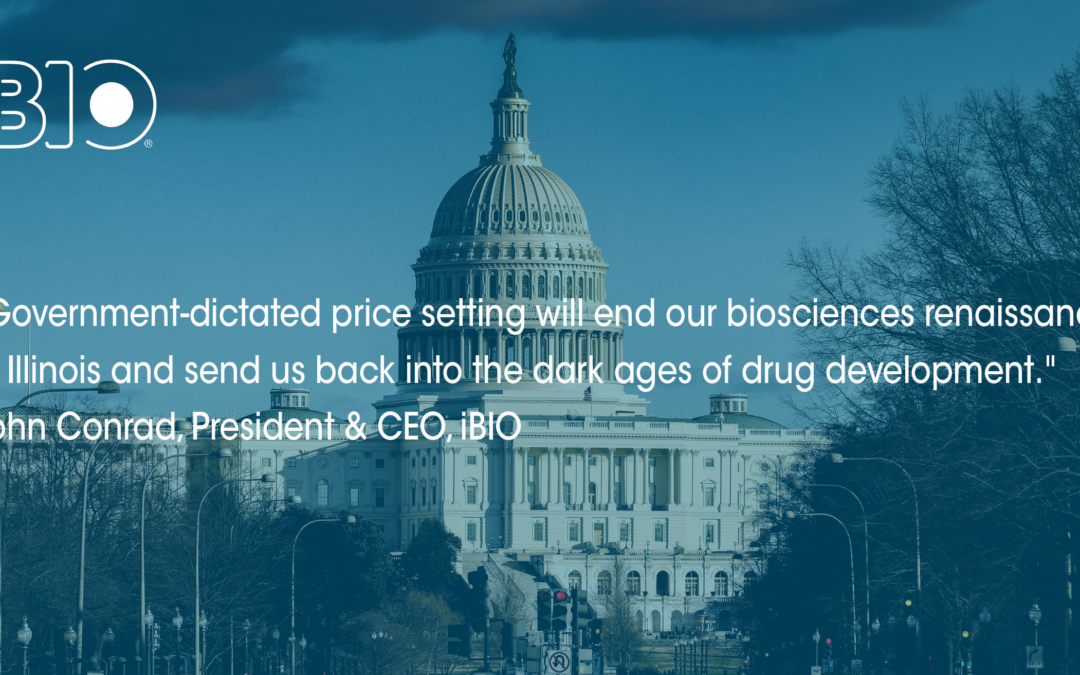The Illinois biosciences community is experiencing a renaissance. Fueled by public and private investment and the passion of our community’s members, we are experiencing unprecedented growth, For example, nearly one million square feet of Class A lab space currently is either delivered or under construction. According to a recent report, Chicago has had the most significant increase in biosciences venture capital funding of any major U.S. market over the past three years.
Everything is clicking into place for the life sciences community to grow and drive innovation to improve patients’ lives and build sustainable growth in a critical and rapidly expanding sector.
So why are Congress and the Biden Administration proposing government-dictated pricing policies, like those included in HR 3, that will kill our startup bioscience ecosystem and reduce patient access to life-saving new medications?
President Biden recently backed proposals, like HR 3, currently being discussed in the House and Senate that would allow the government to dictate the maximum price that a company may charge for a novel drug. HR3 calls for a 95% excise tax penalty should a company refuse to accept the government’s price. This approach would threaten many companies with financial ruin.
Government-dictated price setting will end our biosciences renaissance in Illinois and send us back into the dark ages of drug development. When looking at venture capital, the Vital Transformations report found that over the next 10 years, HR3 would negatively impact $487 billion in corporate venture partnerships that could lead to 68 approved therapies.
This is not “negotiating” drug prices, a term often used by commentators and elected officials to describe how they propose lowering drug prices. It gives the American public the impression that they can have any drug that’s been invented for any price, however low. Overlooked in that bargain is that investors and companies will stop investing in new research programs. Many companies will be forced to give up identifying medicines that haven’t been invented yet.
Allowing the government to dictate what a company may charge for a novel drug will have a chilling effect on innovation. Economic studies on the impact of government price setting, including non-partisan reports by the Congressional Budget Office (CBO), have warned that “negotiations” will result in fewer new medications, essentially defunding R&D for the most challenging diseases. This could mean less money for new treatments for Alzheimer’s, cancer and rare diseases.
A comprehensive study published earlier this year by Vital Transformations estimates that the number of new drugs in development by small and emerging bioscience companies would be reduced by 90% over the next ten years. Sadly, this would mean about 60 new medications that could save or enhance the lives of patients would fall out of companies’ R&D pipelines.
Just in the past decade, the US biosciences industry has created vaccines and therapies for Covid-19, treatments for cystic fibrosis and sickle cell disease, and cures for several cancers and hepatitis C. In the midst of a global pandemic, are we going to kill the innovation ecosystem that provided patients with these lifesaving therapies and vaccines, the ecosystem that is working on new innovations every day?
The fact is that non-partisan, independent public polls have demonstrated that once Americans understand what government “negotiation” is and what the tradeoffs are – restrictions in access or a slowdown in innovation for new treatments – support evaporates.
The impact on private venture capital will be even greater. A recent letter by leading private biosciences venture firms, including a number of Chicago-based companies, representing more than $183 billion in bioscience-focused capital warned that government-dictated pricing for novel therapeutics will force their firms to “shift our investments toward areas still governed by markets, such as technology and consumer goods.” Companies with drug candidates in development would fail to raise more capital, making it pointless for them to spend existing dollars on ongoing research.
The Illinois biosciences community will be disproportionately impacted because we have created a sizable biosciences industry. According to the Vital Transformation’s report, government-dictated price setting will put an estimated 9,500 Illinois jobs at risk, costing the State $17 billion in lost economic output. The explosive growth of our community will stop and our new, state-of-the-art wet lab buildings with one million square feet of Class-A space will sit empty, or be significantly underutilized and precious public and private investments would be wasted
The past 18-months with COVID has demonstrated the importance of having a robust biosciences R&D ecosystem. The Wall Street Journal recently reported a number of House Democrats will introduce an alternative proposal on cutting prescription drug costs. The proposed legislation will strike a more balanced approach to reducing patient out-of-pocket costs, while also protecting R&D investments for new drugs.
Our Illinois Congressional Members and Senators need to standup to the politics driving the current discussion about government-dictated price setting. We call upon our delegation to take the time to consider, develop and propose policies that will ease the cost of prescription drugs at the pharmacy counter and preserve our biosciences innovation ecosystem.

